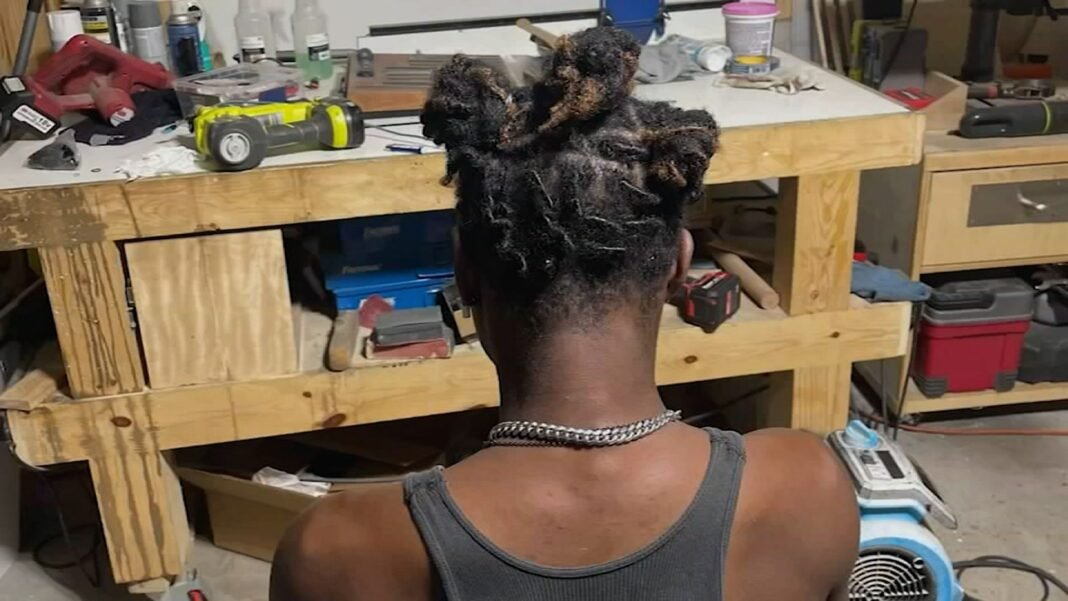In a controversial incident that has ignited discussions on racial discrimination and school policies, a black student in Texas has been suspended from school due to his choice of hairstyle. The incident highlights the ongoing debate around dress codes, cultural sensitivity, and the rights of students to express themselves through their appearance.
The student in question, a 16-year-old boy named Malik, was attending Martin Luther King Jr. High School in Houston, Texas. Malik, like many other students, decided to express his cultural identity through his choice of hairstyle. He wore his hair in neatly groomed dreadlocks, a hairstyle that has deep cultural significance for many black individuals.
However, school administrators at Martin Luther King Jr. High School viewed Malik’s hairstyle as a violation of the school’s dress code policy. According to the school’s dress code, “hairstyles that are disruptive, distracting, or not conducive to a positive educational environment” are not permitted.
Malik’s family argues that his hairstyle was neither disruptive nor distracting. In fact, his dreadlocks were neatly maintained and did not interfere with his ability to participate in the educational process. They believe that the school’s actions were discriminatory, unfairly targeting Malik because of his cultural expression.
The suspension of the black student has led to public outrage and raised questions about whether school dress codes and policies disproportionately affect students of color. Many advocates argue that policies that ban certain hairstyles often discriminate against black students who choose to wear natural or culturally significant styles like dreadlocks or braids.
This incident is not an isolated one. Across the United States, similar cases have drawn attention to the need for reform in school policies to ensure they are equitable and sensitive to the diverse cultural backgrounds of students.
Malik’s family has taken legal action, asserting that his suspension violated his civil rights. They argue that the school’s actions amount to racial discrimination, as the policies disproportionately impact black students. In response, the American Civil Liberties Union (ACLU) has taken up the case, and they are preparing to file a lawsuit against the school district.
The case has also sparked a wider conversation about cultural sensitivity in schools. Critics argue that educators and administrators should receive training on cultural awareness and sensitivity to prevent situations like Malik’s from happening. Schools need to create inclusive environments where students from diverse backgrounds feel comfortable expressing their cultural identity.
Black Student Struggle
In recent years, there have been positive steps towards changing these discriminatory policies. Several states have passed laws banning discrimination against natural hairstyles, such as California’s CROWN Act. These legal changes have paved the way for a broader conversation about addressing racial and cultural bias in schools.
The situation with Malik also raises the question of what message these policies send to young students. When students are penalized for expressing their cultural heritage through their appearance, it can create feelings of shame and a sense of cultural rejection. This can lead to negative effects on a student’s self-esteem and overall educational experience.
Malik’s case has drawn attention not only from local activists but also from national civil rights organizations. The suspension highlights the ongoing struggle to ensure that school policies are equitable, inclusive, and sensitive to the cultural diversity of the student body.
As the case proceeds, it underscores the importance of addressing the deeper issues of racial and cultural bias in schools. Schools must strive to be places of inclusivity, where students from all backgrounds feel safe expressing their cultural identity through their appearance. Malik’s situation reminds us that there is still much work to be done in achieving this goal.




